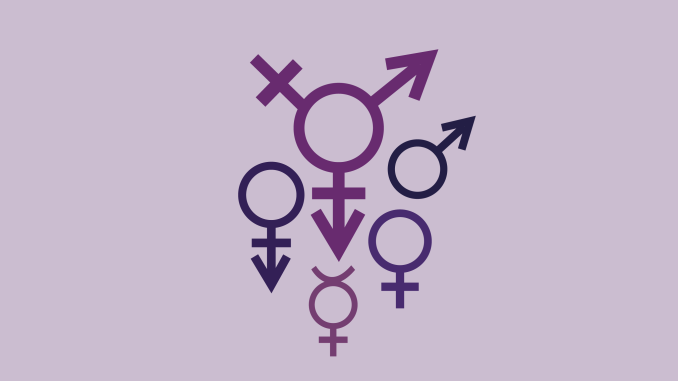
Before the start of the pandemic, I thought I was a cisgender woman who despised the gender expectations set on me. I never deeply analyzed instances when I rejected the gender norms dumped onto me by my peers and society or why I didn’t always like being seen in a feminine way.
As a child, I disliked wearing skirts and dresses, which prompted my mother to make comments about me not being girly enough. It annoyed me that I had to do certain things to feel validated in a society that instills gender roles on people, but I didn’t think much of it because I still viewed gender as being binary and felt closest to being a woman.
Growing up, I was taught people were either men or women. Because I never felt like a man, I continued seeing myself as a woman. It wasn’t until I learned about nonbinary people through social media in my teen years that my ideas on gender started to change.
When I learned about nonbinary people, I was happy there was a way for people who feel constricted by the gender binary to look at gender differently. Because my peers saw me as a woman, I still didn’t think so much about my relationship with gender until the COVID-19 pandemic because I felt hesitant in expressing anything that wasn’t feminine.
Being more isolated during the pandemic gave me the freedom to explore my gender that I wouldn’t have been able to do if I had been around people who had their own ideas of who I was. I was less worried about backlash on my gender exploration and more comfortable exploring it in private.
Toward the end of 2020, I started experimenting with my hair by getting bangs and layers, which led me to start experimenting with how I wanted other people to perceive me.
I had always tried to appear more feminine to make up for other aspects of myself that I was told weren’t feminine, like my voice and body figure, so it felt liberating and fun to branch out.
In late December 2020, I started considering going by they/them pronouns in addition to she/her. I was scared of changing my pronouns to include they/them, fearing I’d be invalidated by others who didn’t understand my changing relationship with gender.
These worries quickly subsided as I have received positive responses from my peers who were willing to start using they/them pronouns for me. Although I want people to challenge how they see me and my gender, it’s been relieving to be surrounded by open-minded people.
Shifting to in-person activities and interactions has made me aware of how people still view me as a woman even after knowing my gender because of their close-minded perspectives.
A couple people have called me a woman despite knowing I’m nonbinary. I’ve also had several peers never refer to me using they/them pronouns while knowing my preference for those pronouns. Although it felt upsetting, I wasn’t too surprised because of how many people might expect me to look androgynous to respect my gender.
I sometimes feel like I have to change my appearance to an androgynous presentation for others to recognize my gender. Although I’ve looked into expressing androgynously, I still feel connected to appearing feminine and don’t want to change myself so people respect my gender.
There are still aspects of my gender I’m unsure about or are constantly changing, like what femininity, masculinity and androgyny mean to me and the labels I use to describe my gender.
I still feel a connection to femininity because of the experiences I share with women and the traits I possess typically associated with being feminine, like sensitivity and intuitiveness. However, I’ve questioned what it means to be feminine and if it can be up to my individual interpretation, which has led me to question my connection to masculinity and androgyny.
I have gone through several labels to describe my gender. My current labels are nonbinary and agender. My understanding of gender has constantly changed as I reflect more on how I see myself and how I want to be perceived by others, which has led to me to learn about through different labels and seeing what resonates with my current feelings.
I never anticipated my gender exploration to be so complex and overwhelming. But I am grateful to have had the chance to take a deeper look into a big aspect of my identity during the pandemic where I have felt less judgment from society.


Be the first to comment